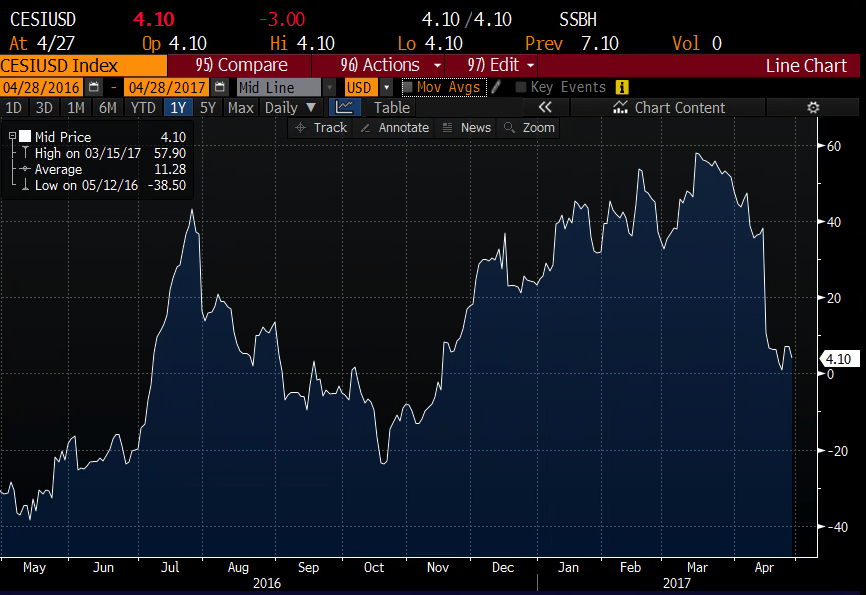Just a bit ago consumer confidence for April came in slightly below expectations, and earlier this morning we found out that the U.S. Economy Expanded at its Slowest Pace in Three Years, per Bloomberg:
The U.S. economy expanded at the slowest pace in three years as weak auto sales and lower home-heating bills dragged down consumer spending, offsetting a pickup in investment led by housing and oil drilling.
Gross domestic product, the value of all goods and services produced, rose at a 0.7 percent annualized rate after advancing 2.1 percent in the prior quarter, Commerce Department data showed Friday in Washington. The median forecast of economists surveyed by Bloomberg called for a 1 percent gain. Consumer spending, the biggest part of the economy, rose 0.3 percent, the worst performance since 2009.
This news coming on the eve of the new President’s first 100-days mark. A President who hasn’t been shy to take credit for the upticks we’ve seen in business and consumer confidence surveys and even the stock market since the election. Back in February Treasury Secretary Mnuchin stated to CNBC that the stock market is a report card on Trump policies:
“There’s a lot of confidence in the Trump administration and in the desire to invest in the U.S.,” he told CNBC in an exclusive interview Thursday. “This is a very competitive place to do business. We’ve got great companies, and you see that reflected in the markets.”
But eventually, the rubber needs to hit the road. And in the first 100 days of this presidency, there has been no legislation passed on health care, tax cuts, or infrastructure. There has been some deregulation affecting specific industries via executive order, mainly loosening environmental protections put in by the previous administration, but nothing of the sweeping stimulus most expect.
So obviously, there is a massive disconnect between the assumptions powering the stock market, at a stone’s throw from all-time highs with historically low levels of volatility, and what we’re actually seeing as far as policy. And for all the talk of the “Trump Trade”, what we’ve seen since the election was mostly in surveys of confidence, not actual economic data (read our discussion of soft vs hard data from April 19th: Rethinking Reflation).
I’ve been making the argument for some time that this “confidence” would run head-on into reality, and investors could get caught offsides when it does.
If you are keeping track, here was Trump’s Contract for America from October weeks before the election, laying out what he Pledged to do in his first 100 days. This somewhat arbitrary mark is psychologically important because it is the first report card of a new administration that reaches the collective consciousness of consumers, business owners, and investors:
@tbone9070 @RiskReversal Well Tom… pic.twitter.com/oTI953XGbn
— Rene (@rothko_fan) April 28, 2017
Basically, nothing has been accomplished, yet the stock market as report card says otherwise. And back to reality, the first three months of this year economic output is coming in well below expectations. And recently, Citi’s Economic Surprise index has been plunging:

Contrast this to the prior administration’s 100 days in office in 2009. Obama really did inherit an economy in shambles, and financial markets in chaos. In the first week of March when U.S. stocks had been more than cut in half from their 2007 highs, and confidence in our markets and frankly our economic system was badly shaken, Obama said the following:
Responding to a question about the suffering Dow, Obama said, “What you’re now seeing is profit and earning ratios are starting to get to the point where buying stocks is a potentially good deal, if you’ve got a long-term perspective on it.”
Unemployment was more than double what it is now, and businesses both small and large, from banks to auto companies seemed to be failing daily, and consumer confidence was at all time lows. The S&P 500 (SPX) has gained 250% since.
The then new President calmed market and economic anxiety with a series of appointments and policies directly stopping the carnage. We can debate forever what those policies should look like, as we could under a Trump administration, but either way you eventually have to deliver what you promise or else all those animal spirits come back to haunt you.
Remember, our current President has portrayed a dystopian view of America (that just doesn’t exist) that only he can fix. Boasting is his brand. But his haphazard governing style, where entire campaign promises change during one phone call with a charming foreign leader, is a threat to the initial confidence all that boasting generates.
And remember that consumer confidence is very different than other gauges. And when the average citizen has seen what sacrifices it would take to repeal Obamacare or who would benefit and who would suffer from the tax proposal, or how the economy suffers from all the incoherence on trade policy, or saber rattling with North Korea, that confidence about the guy from Celebrity Apprentice “fixing everything” will quickly reverse. And this is all before any crisis, either economic or geopolitical, which all Presidents eventually face.
My view of the new President has been clear. And this is a free country, we’re all allowed to have different opinions on politics in general. And frankly, I’m pretty happy about some of these things not going through. But if the stock market as a report card is assuming some well-oiled machine generating stimulative policy from the West Wing and Capitol Hill, no matter your politics, you should be scared to death when the second-semester grades are in the mail.